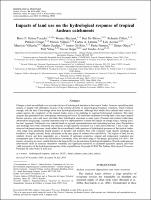Mostrar el registro sencillo del ítem
Impacts of land use on the hydrological response of tropical Andean catchments
| dc.contributor.author | Ochoa-Tocachi, B.F. | |
| dc.contributor.author | Buytaert, W. | |
| dc.contributor.author | De Bièvre, B. | |
| dc.contributor.author | Célleri, R. | |
| dc.contributor.author | Crespo, P. | |
| dc.contributor.author | Villacís, M. | |
| dc.contributor.author | Llerena, C.A. | |
| dc.contributor.author | Acosta, L. | |
| dc.contributor.author | Villazón, M. | |
| dc.contributor.author | Guallpa, M. | |
| dc.contributor.author | Gil-Ríos, J. | |
| dc.contributor.author | Fuentes, P. | |
| dc.contributor.author | Olaya, D. | |
| dc.contributor.author | Viñas, P. | |
| dc.contributor.author | Rojas, G. | |
| dc.contributor.author | Arias, S. | |
| dc.date.accessioned | 2020-03-23T05:26:15Z | |
| dc.date.available | 2020-03-23T05:26:15Z | |
| dc.date.issued | 2016-08-30 | |
| dc.identifier.uri | https://hdl.handle.net/20.500.12542/296 | |
| dc.description.abstract | Changes in land use and land cover are major drivers of hydrological alteration in the tropical Andes. However, quantifying their impacts is fraught with difficulties because of the extreme diversity in meteorological boundary conditions, which contrasts strongly with the lack of knowledge about local hydrological processes. Although local studies have reduced data scarcity in certain regions, the complexity of the tropical Andes poses a big challenge to regional hydrological prediction. This study analyses data generated from a participatory monitoring network of 25 headwater catchments covering three of the major Andean biomes (páramo, jalca and puna) and links their hydrological responses to main types of human interventions (cultivation, afforestation and grazing). A paired catchment setup was implemented to evaluate the impacts of change using a ‘trading space‐for‐time’ approach. Catchments were selected based on regional representativeness and contrasting land use types. Precipitation and discharge have been monitored and analysed at high temporal resolution for a time period between 1 and 5 years. The observed catchment responses clearly reflect the extraordinarily wide spectrum of hydrological processes of the tropical Andes. They range from perennially humid páramos in Ecuador and northern Peru with extremely large specific discharge and baseflows, to highly seasonal, flashy catchments in the drier punas of southern Peru and Bolivia. The impacts of land use are similarly diverse and their magnitudes are a function of catchment properties, original and replacement vegetation and management type. Cultivation and afforestation consistently affect the entire range of discharges, particularly low flows. The impacts of grazing are more variable but have the largest effect on the catchment hydrological regulation. Overall, anthropogenic interventions result in increased streamflow variability and significant reductions in catchment regulation capacity and water yield, irrespective of the hydrological properties of the original biome. | en_US |
| dc.format | application/pdf | |
| dc.language.iso | eng | en_US |
| dc.publisher | John Wiley and Sons Ltd | en_US |
| dc.relation.ispartof | urn:issn:1099-1085 | |
| dc.rights | info:eu-repo/semantics/openAccess | en_US |
| dc.rights | Atribución-NoComercial-SinDerivadas 3.0 Estados Unidos de América | * |
| dc.rights.uri | http://creativecommons.org/licenses/by-nc-nd/3.0/us/ | * |
| dc.source | Repositorio Institucional - SENAMHI | en_US |
| dc.source | Servicio Nacional de Meteorología e Hidrología del Perú | en_US |
| dc.subject | Deforestación | en_US |
| dc.subject | Suelo | en_US |
| dc.subject | Zona Tropical | en_US |
| dc.subject | Biomasa | en_US |
| dc.subject | Hidrología | |
| dc.subject | Hidrometeorología | |
| dc.title | Impacts of land use on the hydrological response of tropical Andean catchments | en_US |
| dc.type | info:eu-repo/semantics/article | en_US |
| dc.identifier.isni | 0000 0001 0746 0446 | |
| dc.description.peerreview | Por pares | |
| dc.identifier.doi | https://doi.org/10.1002/hyp.10980 | |
| dc.identifier.journal | Hydrological Processes | |
| dc.subject.ocde | https://purl.org/pe-repo/ocde/ford#1.05.11 | |
| dc.subject.ocde | https://purl.org/pe-repo/ocde/ford#1.05.11 | |
| dc.subject.sinia | superficie deforestada - Biodiversidad y Ecosistemas | |
| dc.type.sinia | text/publicacion cientifica | |
| dc.identifier.url | https://hdl.handle.net/20.500.12542/296 |
Ficheros en el ítem
Este ítem aparece en la(s) siguiente(s) colección(es)
-
Artículo científico [171]









